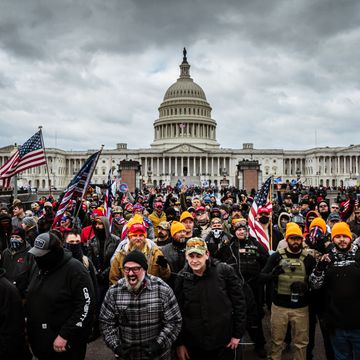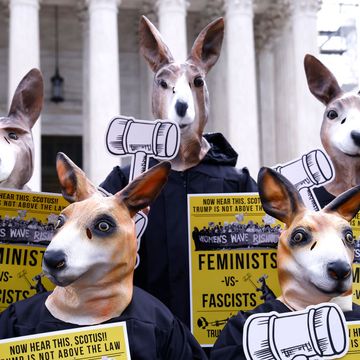I do not tell my funny altar boy stories much anymore, and I have quite a few of them. There was the time I nearly fainted on the groom in the middle of a hot July wedding. As the priest was reading the couple their obligations to each other, the groom kept glancing over while I stood there swaying in front of him. I hope their marriage was canonically correct. Then, far more sacrilegiously, we used to scuff our rubber-soled shoes on the altar carpet and then, at communion, we would touch the communicants on the chin with the paten, the metal plate used to catch the Host if it fell. We let static electricity take care of the rest. Hell booked our rooms long ago.
In fact, we used to love doing weddings, because you always got a good tip from the groom, good enough for junior-high spending cash, anyway. And there was one liturgy we all ran away from because it didn’t pay at all, and because the proceedings took seemingly forever. This was the Good Friday ceremony, which contained the entire Passion narrative from the Gospel of John. It was customary to play this as a performance piece, with readers taking on the different characters from the scripture. It was an endless—and endlessly gloomy—way to spend a Friday afternoon in the spring.
It was also a grotesque public display of antisemitism.
“The Jews” were the primary villains throughout. Not the Sanhedrin. Not Annas or Caiaphas. The Jews. The Jews handed Jesus over to Pontius Pilate. The Jews demanded his execution. The Jews were so duplicitous that they pretended to be loyal to Rome to get what they wanted. The Jews called for Barabbas to be released. The Jews were arrogant enough to shout, “His blood be upon us and on our children.”
There even was a formal prayer for the conversion of the Jews wedged into a series of prayers for divine intercessions that dated back to the 8th century. The prayer for the Jews was the only one on the list during which the congregation was not required to genuflect. Prior to 1955, the prayer read:
Let us pray also for the faithless Jews that Almighty God may remove the veil from their hearts; so that they too may acknowledge Jesus Christ our Lord. Almighty and eternal God, who dost not exclude from thy mercy even Jewish faithlessness: hear our prayers, which we offer for the blindness of that people; that acknowledging the light of thy Truth, which is Christ, they may be delivered from their darkness. Through the same Jesus Christ our Lord, who liveth and reigneth with thee in the unity of the Holy Spirit, God, for ever and ever. Amen.
How welcoming. How utterly Christian of them. And thus were born two centuries of hatred, pogroms, and massacres, and gas chambers, and ovens. The charges of deicide against the Jews were the basis for all these atrocities, and more. Modern popes have fought with varying degrees of enthusiasm to lift this baseless slander from the Jewish people. So it was with some surprise this week that I saw people defending it again—not in a cathedral or a council of the Church but in the Congress of the United States.
Prompted not a little bit by raw opportunism, a bipartisan majority in the House passed a bill called the Antisemitism Awareness Act, mostly to win some political points from the opponents of the various demonstrations at colleges around the country. The cynicism of this was no surprise; every institution of official power has been turned against the demonstrators. But I hadn’t reckoned with Rep. Marjorie Taylor Green or Rep. Matt Gaetz. They voted against the bill on what you could call theological grounds, if you were inclined to insult the study of theology. From The New York Times:
But in trying to use the issue as a political cudgel against the left, Republicans also called attention to a rift on the right. Some G.O.P. members said they firmly believe that Jews killed Jesus Christ, and argued that the bill—which includes such claims in its definition of antisemitism—would outlaw parts of the Bible. Representative Marjorie Taylor Greene, Republican of Georgia, said she opposed the bill because it “could convict Christians of antisemitism for believing the Gospel that says Jesus was handed over to Herod to be crucified by the Jews.”
Representative Matt Gaetz, Republican of Florida, called the legislation a “ridiculous hate speech bill.” On social media, he argued that “the Gospel itself would meet the definition of antisemitism under the terms of the bill,” and included a line from the New Testament about the crucifixion of Jesus. “The Bible is clear,” he added. “There is no myth or controversy about this.”
Certainly not, if you don’t count the 20 centuries of wrestling with the truth on this very point undertaken by Holy Mother Church. Of course, other noted scriptural authorities checked in as well.
“Did the House of Representatives just make parts of the Bible illegal?” Charlie Kirk, a far-right influencer, asked rhetorically on social media. “Yes,” replied Tucker Carlson, the former Fox News host. “The New Testament.”
And there are other exegeses coming from members of the Senate.
Ginned up by Mr. Carlson and other right-wing figures, a handful of Republicans, including Senators Rand Paul of Kentucky and Mike Lee of Utah, have voiced objections to the bill, according to two people familiar with the internal party discussion who spoke on the condition of anonymity.
There are legitimate First Amendment issues to be discussed about the bill, although they seem to have eluded a lot of people who are cheering on the use of militarized police force against the campus demonstrations. This bill, as the Times points out, was designed as a wedge to be used against the Democrats and, instead, it wound up dividing the Republicans and their wafer-thin House majority and sticks some of them on the wrong side of one of the most dangerous and bloody historical tropes of all time.
Because the fact is that an awful lot of the Bible, specifically the New Testament, is antisemitic, most of it traceable back to the political and religious rivalries that existed when the Jesus movement began to coalesce into an actual religion. The author of John’s gospel, for example, made his message quite plain.
So, because Jesus was doing these things on the Sabbath, the Jews began to persecute him. In his defense Jesus said to them, “My father is always at his work to this very day, and I too am working.” For this reason they tried all the more to kill him; not only was he breaking the Sabbath, but he was even calling God his own Father, making himself equal with God.
And St. Paul, correctly described by author Flann O’Brien’s St. Augustine as “that great blatherskite with his epistles in bad Greek,” wrote to the Thessalonians,
For you, brethren, became imitators of the churches of God in Christ Jesus which are in Judea; for you suffered the same things from your own countrymen as they did from the Jews, who killed both the Lord Jesus and the prophets, and drove us out, and displease God and oppose all men.
Subsequent scholars and so-called “Fathers” of the Church felt free to expand on the subject of deicide. St. John Chrysostom, a 4th-century theologian and dog’s breakfast of a human, made antisemitism the basis for almost his entire theology. In Constantine’s Sword, his magisterial history of Christian antisemitism, author James Carroll* picks up the story.
“He killed our God!” That indictment, first brought as an explicit charge of deicide as early as the second century by a bishop, Melito of Sardis, was officially quashed by the bishops of the Second Vatican Council in 1965, yet it remains the ground of all Jew hatred. That, at bottom, is why it is inconceivable that any Jew should look with equanimity on a cross at Auschwitz, and why no Christian should be able to behold it there as anything but a blow to conscience. “Though there were other social and economic conditions which were necessary before the theological antecedents of antisemitism could be turned into the death camps of our times,” the Jewish theologian Richard Rubenstein has written, “only the terrible accusation, known and taught to every Christian in earliest childhood, that the Jews are the killers of the Christ can account for the depth and persistence of this supreme hatred.”
I don’t expect that the likes of MTG or Matt Gaetz thought about their votes as anything more than a way to stick it to Speaker Mike Johnson. But they picked up an ancient, poisoned spear to do it. There’s a grinning devil just offstage like he’s never left.
*This article originally appeared in the Last Call with Charles P. Pierce newsletter on May 5, 2024. This article originally misstated James Carroll’s name. The shebeen regrets the error.

Charles P Pierce is the author of four books, most recently Idiot America, and has been a working journalist since 1976. He lives near Boston and has three children.













